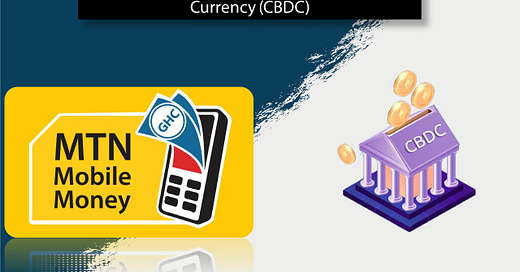Mobile Money in Ghana and Central Bank Digital Currency: A Comparison
In recent years, Ghana has witnessed a significant transformation in its financial landscape, driven primarily by the rise of mobile money services. Mobile money (also known as MoMo), led by telecommunications companies like MTN Ghana, Telecel, and AirtelTigo, has revolutionized how Ghanaians conduct transactions. Meanwhile, the Bank of Ghana is exploring the introduction of a Central Bank Digital Currency (CBDC), called the eCedi. Both mobile money and the potential CBDC promise to shape the future of money in Ghana, each with its unique features and impacts.
Similarities
1. Digital Nature: Both mobile money and CBDC are digital forms of currency, allowing users to make transactions electronically. This digital shift offers greater convenience and security compared to carrying cash.
2. Financial Inclusion: Both aim to enhance financial inclusion. Mobile money has already significantly increased access to financial services, particularly for the unbanked population. Similarly, the CBDC is expected to further integrate more Ghanaians into the formal financial system by providing a state-backed, secure digital currency.
Differences
1. Issuer: The primary difference between the two lies in their issuers. Mobile money is provided by private telecommunications companies, whereas the CBDC will be issued by the Bank of Ghana, the nation's central bank. This distinction is crucial as it influences trust and stability in the currency. (the bank of Ghana ultimately controls all monetary policies)
2. Regulation and Control: Mobile money operates under regulations that require telecom companies to work with commercial banks for deposits. In contrast, the CBDC will be directly controlled and regulated by the central bank, ensuring a more streamlined and government-backed system.
3. Technology and Security: The technologies behind these systems differ as well. Mobile money relies on existing telecom networks and infrastructure, while the CBDC will likely employ advanced blockchain or distributed ledger technologies, enhancing security and reducing the risk of fraud.
The Future of Money in Ghana
Mobile Money's Future: Mobile money has a robust and growing presence in Ghana, and its future looks promising. It will continue to expand, integrating more services like insurance, savings, and loans, making financial services accessible to even more people. (MTN is working a partnership deal with MasterCard, this will give MoMo users to over 100 million acceptance points worldwide)
CBDC's Potential: The eCedi holds the promise of revolutionizing the financial system by providing a secure, government-backed digital currency. This could reduce reliance on cash, lower transaction costs, and enhance monetary policy implementation. The CBDC can complement mobile money, providing a secure option for large transactions and savings. And will be very helpful for cross-border transactions.
Mobile money (MoMo) and the upcoming CBDC in Ghana are set to redefine the financial landscape. While mobile money has already made significant strides in promoting financial inclusion and convenience, the CBDC promises to enhance financial stability and security. Together, they represent a future where digital currency plays a central role in everyday transactions, enabling economic growth and inclusion in Ghana.



